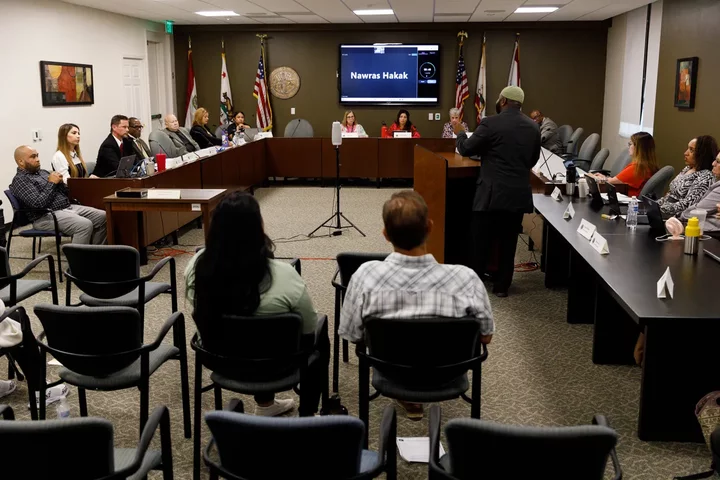Yusef Miller of the North County Equity and Justice Coalition speaks during a Citizens’ Law Enforcement Review Board meeting at the San Diego County Administration Center on Oct. 17, 2023. Photo by Kristian Carreon for CalMatters.
On the one hand, allowing local advisory boards and commissions to meet remotely could make it easier for more Californians to take part, including those with disabilities or in jobs that make it hard to attend in-person meetings.
But on the other, shouldn’t people have the opportunity to address their public officials face-to-face?
That was the heart of the discussion around Assembly Bill 817, one of several recent proposals seeking to extend flexible meeting policies born out of the COVID-19 pandemic. The Legislature agreed last year to do that for state boards, until Jan. 1, 2026.
But lawmakers declined to give that flexibility for local advisory boards, including planning commissions and budget oversight committees, beyond emergency situations, caregiving and other exceptions they granted during the pandemic.
The broader bill failed in the Senate’s local government committee last week, failing to get a single “yes” vote. Four members voted “no” and three others didn’t vote.
Sen. María Elena Durazo, a Los Angeles Democrat who leads the committee, said that since advisory boards are often appointed by elected officials and make recommendations that lead to action, “it is vital that the public can inform the recommendations these bodies make.”
“I don’t believe that you can as effectively do that on a computer screen instead of in person,” she said.
Currently, state law requires local boards to meet where the public has access. If that’s not at a central location like a county building, members are required to post a notice and allow the public to attend, even at their homes.
This bill — introduced by Downey Democrat Blancha Pacheco and passed by the Assembly on a 54-8 vote in January — would have, until Jan. 1, 2026, let advisory bodies have no board members and only one staffer at a physical meeting location, and one agenda posted at the staffer’s location. It would have required board members to be on camera.
Pacheco said at the June 5 hearing that her bill would bring local boards in line with state ones.
But press and government transparency advocates saw the bill’s failure as a “critical victory for open government.”
“This bill would have taken a meat cleaver to the Brown Act when a scalpel could give flexibility to those who truly need it,” said Brittney Barsotti, general counsel for the California News Publishers Association. The group is asking the Legislature to hold hearings to craft a better bill next year.
Durazo said Pacheco had declined amendments that would balance transparency with accessibility by requiring board members who get paid to attend in person, and that a certain number of members meet in person.
Ginny LaRoe, advocacy director for the First Amendment Coalition, which pushes for free speech and government transparency, noted that videoconferencing is already available to officials under a variety of circumstances.
“But it shouldn’t be the only option for the press and public to keep tabs on government,” she told CalMatters.
The bill’s supporters, which included Disability Rights California and groups representing local governments, said the state has a responsibility to allow more people to take part on boards and commissions.
“California is a huge state, and most counties have a large geographic area, and members find it very difficult, if not impossible, to attend meetings,” Janie Whiteford, president of the California IHSS Consumer Alliance and a member of a Santa Clara advisory committee on in-home supportive services, told the committee. She noted that one member had resigned because taking paratransit to and from meetings would take six hours.
“If you cannot conduct business due to a lack of quorum, the alternative is that we simply do not meet and county decision makers are left without local input,” Whiteford said.The influential AARP also supported the bill. Sens. Nancy Skinner and Scott Wiener, both Democrats from the Bay Area, declined to vote on the bill — a significant departure from their typical voting alignment with the retiree advocacy group, shown in the CalMatters Digital Democracy database.
Opponents of AB 817 said last year’s bill that gives exceptions in emergency situations must be given time to play out before making further changes to open meeting laws.
“We’ve worked on proposals that kind of narrowly tailor the flexibility for public officials who have a need for more flexibility,” LaRoe said. But most of the bills on open meeting laws “tried to take things in what we feel is the wrong direction.”
Two narrower bills related to open meetings did pass the committee last week: A bill by Democratic Assemblymember Tasha Boerner allowing closed sessions to discuss cybersecurity threats, and one from Republican Assemblymember Josh Hoover allowing email-only notifications to certain media for emergency school board meetings instead of by telephone.
###
CalMatters Digital Democracy reporter Ryan Sabalow contributed to this story.
CalMatters.org is a nonprofit, nonpartisan media venture explaining California policies and politics.

CLICK TO MANAGE